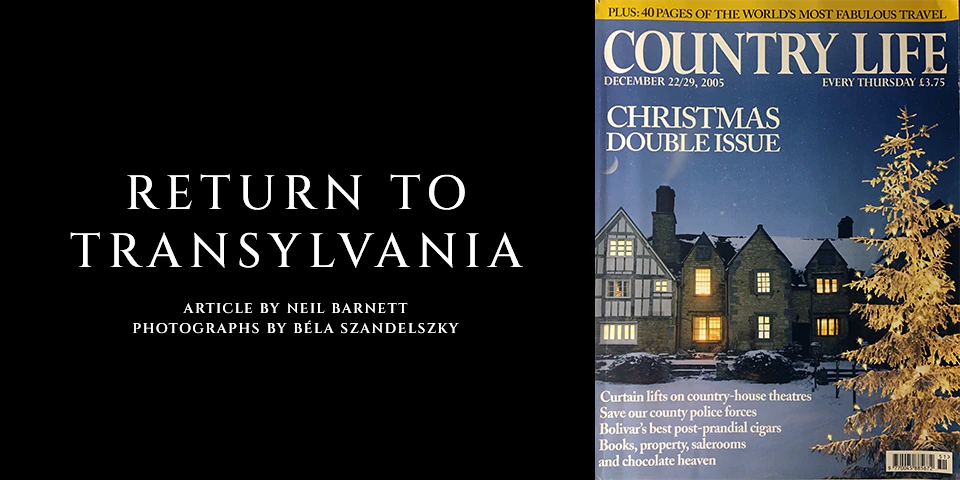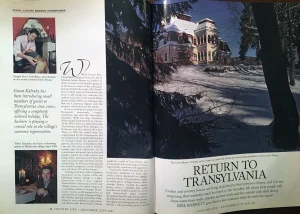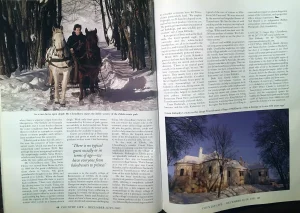Contact us
RECEPTION
+4 0724 003 658
reservations@zabola.com
EVENT MANAGER
Mrs. Imola Gazda
+4 0722 180 152
events@zabola.com
Return to Transylvania

Castles and country houses are being reclaimed by their previous owners, and it is not surprising that romantics want to return to the Arcadian life where local people still draw water from wells, practise ancient crafts and live outside with their sheep. Neil Barnett goes back a few centuries when he visits the region.
By Neil Barnett
When Gregor Roy-Chowdhury resigned from his job at Salomon Smith Barney in London in 2002 to return to his family’s property in Romania, some of his colleagues perhaps doubted his sanity. Mr Chowdhury’s Zabola estate in Transylvania had been in the family for centuries: his mother was a scion of the ancient Mikes family and her father was a Bengali raja. But the Ceausescu regime stole the property and expelled the family.
It was to reclaim the property under Romania’s notoriously complex restitution laws that Mr Chowdhury returned. With his dog, Charlotte, following his words intently, he explains:
In the 1920s, there was land reform after Transylvania passed from Hungary to Romania, and this reduced the estate. Then, in 1949, the entire estate was expropriated by the Communists. But my mother never stopped believing that we would reclaim our property.”
He continues:
Day to day, restitution is a full-time job. You have to talk to lawyers, mayors and local politicians, sit on commissions and spend time in the land registry. And if you really want to get things done, you have to be there full time; you can’t expect lawyers to do the whole thing.”
So far, he has reclaimed all the family’s properties in the Zabola area and about 30% of the forestry.
Nestling at the foot of the Carpathian Mountains on the frontier of the old Habsburg Empire, Zabola is a place where time seems to have stopped. Transylvania’s mountains, forests and villages remain a last idyllic outpost of a vanishing medieval Europe. Romanians, Saxons and Hungarians live in a patchwork of simple farming villages like Zabola, drawing water from wells, living by near-subsistence agriculture and artisan work. Bram Stoker’s Dracula might be a myth, but this beautiful and ancient region remains impenetrably mysterious and suggestive.
Covered by thickly forested hills and mountains inhabited by bears and wolves, where shepherds live outside with their flocks, Transylvania is truly Arcadian. Village houses retain a timeless feel, with nameless cats huddled under stoves and home-made plum brandy (hazipalinca) liberally dispensed to guests throughout the day. Many of the people who appear to be Hungarians are in fact Székely, a self-governing warrior caste who claim a separate origin. The Székely are famously hospitable, but it is not hard to discern the inner toughness that has allowed them to endure for centuries.
Zabola’s park includes the old castle—currently the preserve of bats—and a newer castle, which was used as a state sanatorium until summer 2005. Perhaps the most intriguing building is the mobile Swiss House, now run as a guesthouse while the castles are being restored. Mr Chowdhury explains:
The Swiss House was moved from Berne to Paris in 1889 for the great exhibition, then to Vienna. My great-grandmother bought it in the 1890s and moved it to Zabola.”
When it was reclaimed from the state, there were chickens in the dining room. Today, the house has been beautifully restored with solid furniture, local carpets, warm colors, and roaring log fires—a perfect retreat from the rigours of the Transylvanian winter after a horse-drawn sleigh ride.
Guests are unlikely to feel crowded—only four rooms surrounded by 84 acres of park. From winter 2006, rooms in the newer castle will be available. Guests are picked up from Bucharest and offered as much or as little guidance as desired.
There is no typical guest socially or in terms of age—we have everyone from hairdressers to princes.”
One excursion leads to the nearby village of Kommando, a former military outpost of the Austro-Hungarian Empire that now survives through logging. In winter, the ski resorts of Poiana Brașov, Sinaia and Predeal are about an hour away. Mr Chowdhury believes that tourism can restore the estate’s traditional role as the village’s economic center and help stem the youth exodus: “When the hospital moved, some of the 50 employees moved with it, so there is a need for jobs.” To the west, Mr Chowdhury’s cousin Count Tibor Kálnoky runs a similar venture in Miklósvár, offering tailored holidays in restored village houses. He explains: “This is Europe as it was 100 years ago.”
His family settled in Transylvania in 1252. Since 2000, he has hosted small numbers of guests in a way that is intimate, sustainable, and revitalizing for the village. The insane policies of the Ceausescu era, followed by the wrenching transition to a market economy, have hit Transylvania hard. But projects like Count Kálnoky’s employ 20 people, use local produce, and reinvest in restoration and conservation. He is also conducting bird surveys and lobbying for environmental protection of the area. 80% of his guests are British, but:
There is no typical guest socially or in terms of age. They mostly have a nice time together and make friends—it’s rather like an Agatha Christie house party.”
With wine, pálinca, and hearty Transylvanian cuisine, guests relax in the cellar dining room, often forming lasting friendships.
Taner Dedezade, a young London barrister, and his wife Katharine were also drawn to Transylvania. He says:
We were attracted by the unusual and unspoiled beauty. We like the idea of wolf tracking, and the way you can step back in time and see horses and carts in the village. What struck me most were the different pockets of culture. We’d definitely come back in other seasons.”
Wildlife programmes, birdwatching, bear tracking, and visits to Saxon churches and crater lakes like Lake St. Ann offer enough to keep visitors engaged for up to a fortnight. Both men believe that sensitive, low-volume tourism can invigorate rural economies, create jobs, and offer a new life for neglected estates.
Article by Neil Barnett

